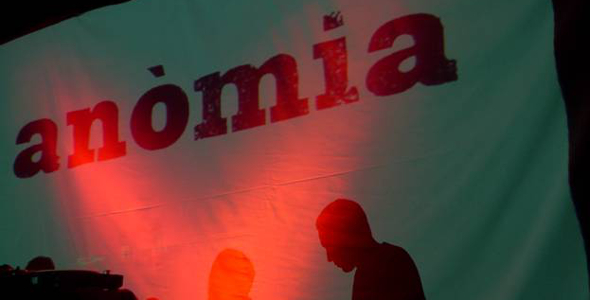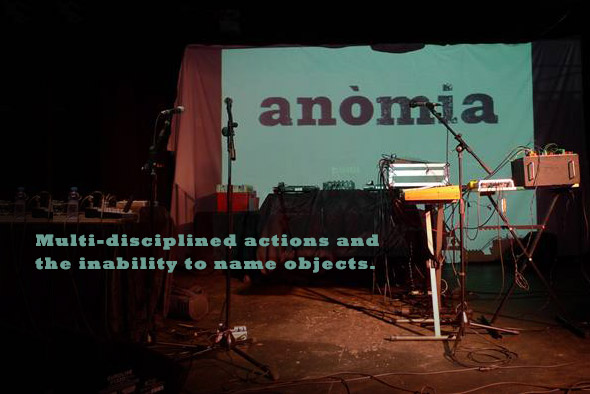Anòmia: Multi-disciplined actions and the inability to name objects
Arnau Sala and Ivy Barkakati, the two Barcelona-based individuals behind the intriguing Anòmia imprint, speak with Matthew Kent about their multi-disciplined approach to running a label.
In the space of a year Arnau Sala and Ivy Barkakati’s Anòmia label has already released a diverse and highly enviable array of musical documents, both contemporary and archival. Tapes have been unearthed from the eminent NYC no wave band Mars alongside a techno 12” from L.I.E.S. regular DJ Bookworms. Each are products of the label founder’s respective pasts, be it Sala’s relationships and long-standing associations with the experimental noise scene or Barkakati’s background with US underground dance music, and they ground everything with a sense of connection – as diverse concepts explored within a shared circle of friends. There also exists a longer term interest in the project acting as a platform for a range of multi-discipline actions alongside releases.
“I used to run a label called Ozonokids that I started in 1999 with other people,” says Sala of his nascent beginnings, “it was totally DIY, since it started as a hardcore / punk label, but it all was very messy and unproductive. Like I would never really get the money back after putting out any releases and it took a lot of my time and gave me a great deal of stress.”
Ozonokids actually originally began in 1997 as a zine distro, slowly involving friends until records began to be pressed – mostly for the hardcore and punk bands they knew, and in runs that easily sold whilst they toured. This changed in 2003 when Arnau moved to Philadelphia and altered the label to align with a more ‘experimental’ focus. Working with the cheaper medium of cassettes and CDrs a momentum was kept for a time, but as he expresses to me over email, ‘the problem was the catalogue was too compulsive and I didn’t put too much thought into it, which lead to a lot of unsold releases that I ended up giving away. It was very messy.’ A lot of time and money was lost, and the decision was eventually taken to close the project down in 2011.
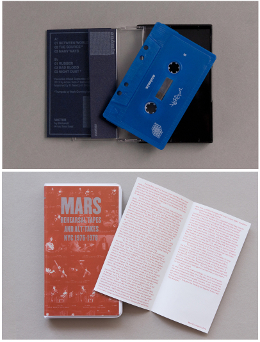 Perhaps indicative of the turbulence at the heart of the label, picking at Arnau’s many musical projects individually or chronologically is tricky. His beginnings mirror the label’s, starting out in punk and hardcore bands aged 13, on drums, then moved into the realm of noise and improvisation and electronics around 2003 – circuit bending, feedback, no-input mixing, effects etc. Any releases were often pressed up on Ozonokids – including an array of collaborations with artists close to or already featured on the label.
Perhaps indicative of the turbulence at the heart of the label, picking at Arnau’s many musical projects individually or chronologically is tricky. His beginnings mirror the label’s, starting out in punk and hardcore bands aged 13, on drums, then moved into the realm of noise and improvisation and electronics around 2003 – circuit bending, feedback, no-input mixing, effects etc. Any releases were often pressed up on Ozonokids – including an array of collaborations with artists close to or already featured on the label.
Of his current enterprises, the most well-known is probably Veiled. The duo started in 2009 with friend and collaborator Robert Francisco (who also works solo as M Ax Noi Mach). “Rob would come to Europe to tour and he would be based in my house in Barcelona, and so we would spend long periods of time together” Arnau says. Collecting photo-booth pictures for an art project, they re-imagined the lives of the people in the photos, and developed the concept into a form that the band then derived from, probing further. “Somehow Veiled itself is about privacy, secrecy, hidden paths, but also, hidden pleasures, hidden perversions, secret places. It started out as an Industrial/Power Electronics project. It has maintained that essence while venturing into more minimalist/ambient territory. Later on, the incorporation of synths gave us a lot of space for experimentation.” A new self-titled LP just out on Blind Prophet expresses a hitherto unseen move into a more melodic and structured, or ‘pop’, style.
Ex-Con or Exoteric Continent is a solo undertaking that explores similar ideas in another way. Here the sonics are commonly fairly minimalist in terms of palette, digital-industrial rhythm tracks that feel oddly sharp for lack of reverb and bring to mind the work of Mark Lord, KPLR or the most pared-down Three Legged Race. “Somehow making solo music for me is a way to test different techniques.” Arnau says. “Each release has a different structure because of how it’s built. I like to go back and forth between advanced and primitive techniques as I learn.”
A particular attraction to process and improvisation seems to exist in many of these projects, and the system under which the release is created is often quickly brought up as he moves on to explain it. A large part of what occurs when recording is owed to chance happenings within boundaries that Arnau sets himself. “But it is somehow mutating” he says. “When I record now, I rarely use the first take. I usually use the recording to listen, re-think the track and change some things, record again. In the past I would always just record and the track would mutate live.”
The quality of this and other work by Arnau has meant other labels have also begun to pursue releases. A double cassette released under his full name and packed with strange, knotty abstracts has just appeared on Scumbag Relations/Sleepy Cobalt., and Silvox Recordings and Opal Tapes have recently pushed the Ex-Con tapes. Now dubbing that particular project its originally intended full-name ‘Exoteric Continent’, a major new work entitled Primera Norma is expected on Hospital Productions soon.
“I am personally not very interested in doing reissues. I really enjoy buying reissues, but as projects, to me reissues are basically fetishist.”
Maintaining this quantity of output is no mean feat, and in combination with the experience of Ozonokids and the rising interest from outside labels, you wouldn’t exactly blame him for steering away from repeating attempts to run one himself. But as he presses upon me, fully parting with control over his music is difficult. “As an artist I don’t want to ever have to rely on other labels to put out my records.”
The kernel of an idea developed a few years ago offered a chance to start afresh, continuing to develop his interest in releasing friends music, as well as his own – all within a deeper and multi-faceted artistic program.“I decided I wanted to start something new that would be more of a ‘platform’ dedicated to produce projects by different kind of artists, where I would work on projects of all kinds (in the form of actions, physical releases, publications, residencies etc…) together, interacting.” says Arnau. “That way I wouldn’t only be able to support the artist, but also get something back in the form of knowledge.”
The formulation of this idea – the central principle of Anòmia – came as he struck up an important new relationship with Ivy Barkakati whilst touring in Baltimore. When she permanently moved to Barcelona it made sense she’d join and be a part of the label, offering a new depth of vested interested in dance music to diversify the labels output. Indeed, the name Anòmia was her idea – a word that in English (Anomia) or Catalan (Anòmia) translates as an inability to name objects or recognise them by name.
Though still relatively young, Anòmia already bears fruit. The ‘Productions’ department has 6 releases under its belt – archival projects from highly reputable names like no-wave heroes Mars and Javier Hernando’s Xeerox outfit (including Liaisons Dangereuses vocalist Krishna Groineau), plus contemporary debuts from Morten J. Olsen and Rubén Patiño as N.M.O and Arnau and Ivy’s Vactor. Each release is utterly beautiful as object and art, with immaculate attention to detail in terms of presentation. Again, Arnau says, it feeds back to the idea of Anòmia as a broader project, “somehow focused on sound or music, but not exclusively on either one or the other.” Clearly a lot has been learned from the mentality Ozonokids was run under, with greater recognition for the importance of patience and consideration in each publication.
At this point, the archival works have probably garnered most attention. Arnau is quick to stress that they exist not as reissues, but rather long-lost recordings from friends (especially those from Catalunya) that might otherwise have never seen the light of day. “I am personally not very interested in doing reissues. I really enjoy buying reissues, but as projects, to me reissues are basically fetishist” he says. “But with archival projects where some recordings were never known before and the artist needed a platform like ours to make it happen… It’s a direct interaction between label and artist. I really like that.”
The first of these, the Mars box set, came about in 2010 as Mark Cunningham returned to Barcelona from Massachusetts with a stack of tapes under his arm. They contained hours of rehearsal recordings from Mars – from right back when they were still playing under the name China through their career and all the way until they split. It captures the band at their most unbridled and experimental, not to mention primitive.
The second, Xeerox’s Recuerdo Espectral De Un Viejo Decorado Eléctrico, exists as a fascinating document of underground Barcelona in the late ‘70s – fuelled by ’Jerry Latex’ (Krishna Goineau) and Javier Hernando’s shared animation for a particular kind of provocative punk that favoured a devaluation of skill. Meeting in a record store called Gay&Co (that Hernando worked in), they discovered a shared love of Pere Ubu’s Datapanik in the Year Zero, Metal Urbain and the music of Krafterk, Neu and Faust. These conversations matured into practice room sessions – ‘devolving’ instrumentation into strange form through tape collage, synth work, shredded guitar and sheer inability to play their instruments. These sessions form the basis of the Anòmia LP, which is the first major offering of the work.
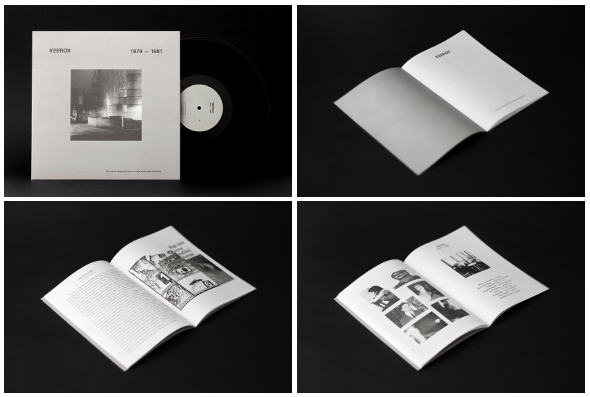
Category number ANM003, a printed poster for ACC001, hints at what is the biggest step towards the more diverse artistic platform Arnau and Ivy strive towards with Anòmia. These ‘Actions’ (ACC001 is the numerical representation for the concept) represent a move into the live arena through combinations of performance and audio/visual work. The closest approximation to the idea might be the recent series of live works and installations with the PAN_ACT showcase in NYC.
“The actions are another form of output that I feel is essential for what we do and what we want to do” explains Arnau. “We decided to number the actions as a way of making them as relevant as the releases themselves.”
ACC001 (on 28th December last year) debuted the idea with a collection of performances from artists on the roster, plus DJ sets from Zero & David Lost. ACC002 was scheduled to be a showing of Rubén Patiño’s Liquid Marble – a VHS collage of ‘diverse European cities’ in combination with audio work. Unfortunately neither went quite as hoped, the latter actually eventually being cancelled due to a miscommunication with the venue, and so the idea has been moved to the back of the queue a little at the minute.
“The actions are something that I do think should be a big part of Anòmia” expresses Arnau when the topic is brought up, “but I feel like in Barcelona there is very little interest in this particular kind of event at the moment. After the first two actions didn’t work out we just decided it was time to focus on the things that actually worked until we see a way of making it happen, either in or outside Barcelona.”
Residencies are also planned, all being well – with Arnau and Ivy hoping to allow friends and fellow artists to pitch ideas for work, then offering the space and time to allow its creation. “The idea was strongly influenced by l’Ull Cec, run by our friends in Berlin and Barcelona who we sometimes work with.” Arnau says of it. “We might start doing that in 2014, but because it’s economically difficult we can only do so many”.
In contrast to Arnau’s deep involvement in the experimental scene, Ivy’s own interests lie heavily within the world of dance music – influenced by years hanging out with DJs and electronic music producers in the US. It’s this that has formed the basis of an interesting new development within Anòmia’s short life thus far. The Mars and Xeerox sessions now jostle alongside the hardware techno jams of NYC’s DJ Bookworms, who provides the first in a new series of dance 12”s for the project with Mechanism.
Early reviews have been quick to jump on the new no-wave relationship it explores, and though it’s still minimalist, drum-machine-workout led gear there’s a notable sideways step from his softer touch with recent L.I.E.S. twelve Japanese Zelkova or even the Confused House jams. It’s still markedly different from the other Anòmia works so far in terms of applicable genre, close to Drop Bass Network or Planet Core Productions-era hardcore techno in places, but overall it still feels closely bound to the overall aesthetic.
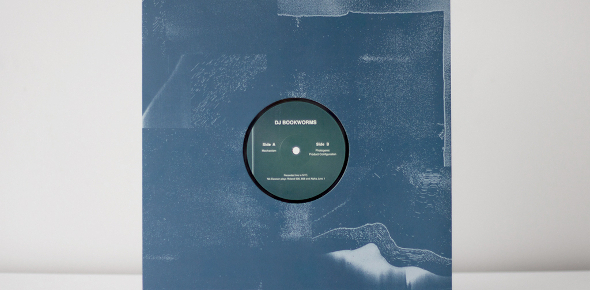
Arnau and Ivy’s dualistic relationship with the worlds of noise and dance music seems the perfect embodiment of recent trends for collisions of the two from producers on both sides of the fence. Bringing the subject up, Arnau, understandably, is hesitant to define Anòmia too closely with it.
“I’m very aware of the crossover between experimental or noise and dance music that has been especially noticeable for the last two years.” Arnau says. “However, I would find it very difficult to say whether Anòmia could work as a representation of this phenomenon, as I see it as the product of the encounter of two people with different (but compatible) tastes.” Ivy adds that she doesn’t pay too much attention to the noise and experimental scene. ‘I am more attuned to dance music, so I’ve read about this topic from that perspective. Anòmia’s entrance in the 12” zone is largely due to my enthusiasm for dance music.”
“We like to decide which projects we work on in a very natural way, working with artists on a personal level. If Ivy weren’t friends with Nik (Bookworms), this release might never have happened, in the same way that a Mars release wouldn’t have happened if Mark wasn’t our friend.”
Anòmia is still a project in development, particularly with ambitions for its wing of multi-disciplined actions, but a great deal has already been accomplished. The concentration on highlighting work from close, personable relationships is admirable – and gives the project a focus that allows for great care and attention to detail to be afforded to each release. Several releases are already lined up that continue down this path, and that continue the interest in aligning contemporary works with those that are more retrospective. There are also hopes for Ivy to produce a solo release, either as IVDB (a name she has worked and DJ’d under) or with a new name.
As for the other branches of Anòmia? “We have some audio-visual projects in mind but I can’t really be more specific because they are not confirmed yet” Arnau offers. “We are still at a ‘training level’, still learning how to do things better, which is one of the main reasons why we do this, to learn.”
“I’ve always felt that you work with people you feed off of and vice versa (I hope). I see Anòmia as an exchange project.” Arnau reflects. Though with a caveat: “On the other hand, in my opinion, defining the concept and aesthetic is essential in a project like ours. I feel that it can be difficult sometimes to maintain a coherent line once you cover a wide range of styles – not to mention the fact that we are two people with different interests – but we are putting effort into making that happen.”
Interview by Matthew Kent
Header image by Ilaria Pace adapted from a photo used courtesy of Diego Bustamante
All other live photography used courtesy of Diego Bustamante
